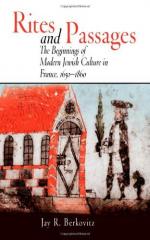|
This section contains 4,840 words (approx. 17 pages at 300 words per page) |

|
Rites of passage are a category of rituals that mark the passage of a person through the life cycle, from one stage to another over time, from one role or social position to another, integrating the human and cultural experiences with biological destiny: birth, reproduction, and death. These ceremonies make the basic distinctions, observed in all groups, between young and old, male and female, living and dead. The interplay of biology and culture is at the heart of all rites of passage, and the struggle between these two spheres asserts the essential paradox of humanity's mortal heritage. Humans dwell in an equivocal world, for they belong to both nature and culture, as Claude Lévi-Strauss has pointed out. It is through rites of passage that people are able to contemplate, to formulate and reformulate, their ambivalent condition of animal and human. Biology...
|
This section contains 4,840 words (approx. 17 pages at 300 words per page) |

|



![View Rites of Passage An Overview [further Considerations]](https://d22o6al7s0pvzr.cloudfront.net/images/bookrags/aero300/content/btn_next.png?1737598932)
